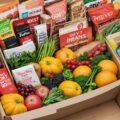The Importance of Smart Food Shopping
Making mindful choices at the grocery store is one of the most impactful ways we can support our health and wellbeing. Smart food shopping isn’t about restriction or perfection – it’s about nourishing ourselves and our loved ones with wholesome, delicious foods that make us feel our best. By approaching our shopping trips with intention and nutritional knowledge, we can fill our carts and kitchens with foods that truly serve us.
Nutritionists can be invaluable guides on this journey, offering evidence-based advice to help us navigate food labels, understand nutrient density, and make choices aligned with our individual needs and values. Their expertise allows us to shop not just for calories, but for true nourishment – body, mind and spirit.
Key Principles of Nourishing Food Choices
While everyone’s ideal diet is unique, there are some foundational principles nutritionists often recommend when it comes to food shopping:
- Focus on whole, minimally processed foods: Fruits, vegetables, whole grains, lean proteins, nuts, seeds, and healthy fats form the core of a nourishing diet.
- Embrace plant diversity: Different colored fruits and veggies offer an array of beneficial nutrients and phytochemicals.
- Choose quality over quantity: Opt for nutrient-dense foods that offer more nutritional value per calorie.
- Read ingredient lists: Favor foods with short, recognizable ingredient lists over highly processed options.
- Consider sustainability: When possible, choose local, seasonal, and environmentally-friendly options.
Remember, these are guidelines, not rigid rules. The most nourishing choices are those that align with your personal health goals, cultural background, and lifestyle.
Navigating the Grocery Store with Confidence
The layout of most grocery stores is designed to encourage impulse purchases, often of less nutritious items. Here are some strategies nutritionists recommend for making mindful choices:
- Shop the perimeter: This is where you’ll typically find fresh produce, lean proteins, and dairy.
- Make a list: Plan your meals in advance and stick to your list to avoid impulse buys.
- Don’t shop hungry: This can lead to less mindful choices driven by immediate cravings.
- Take your time: Give yourself space to read labels and make considered decisions.
- Explore the bulk section: This can be a great place to find whole grains, nuts, and seeds at better prices.
Remember, every shopping trip is an opportunity to practice and refine your approach. Be patient and kind with yourself as you develop new habits.
Understanding Food Labels and Making Informed Choices
Food labels can be confusing, but they contain valuable information when you know how to interpret them. Here are some key things nutritionists recommend looking for:
- Ingredient list: Ingredients are listed in order of quantity. Look for short lists with recognizable ingredients.
- Serving size: All nutrition information is based on this, so check if it aligns with your typical portion.
- Nutrient content: Pay attention to key nutrients like fiber, protein, vitamins, and minerals.
- Added sugars: The new nutrition label distinguishes between naturally occurring and added sugars.
- Health claims: Be wary of exaggerated claims on packaging. The most nutritious foods often don’t need to make claims at all.
Remember, no single nutrient defines a food’s healthfulness. It’s the overall pattern of your diet that matters most.
Balancing Nutrition and Budget
Eating well doesn’t have to break the bank. Here are some budget-friendly tips from nutritionists:
- Buy seasonal produce: It’s often cheaper and at peak nutrition.
- Consider frozen fruits and vegetables: They’re just as nutritious and often more affordable.
- Choose less expensive protein sources: Beans, lentils, eggs, and canned fish are nutritious and economical.
- Buy in bulk: For non-perishable items you use regularly.
- Cook at home: It’s almost always cheaper and healthier than eating out.
Remember, investing in your health through nutritious food choices can save money on healthcare costs in the long run.
Embracing Mindful Eating Beyond the Shopping Trip
Smart food shopping is just the first step in nourishing ourselves. Nutritionists emphasize the importance of mindful eating practices to fully benefit from the foods we choose:
- Eat slowly and without distractions: This allows you to truly enjoy your food and recognize fullness cues.
- Practice gratitude: Take a moment to appreciate the nourishment your food provides.
- Listen to your body: Eat when you’re hungry and stop when you’re satisfied.
- Enjoy your food: Choose foods you truly enjoy. Nourishment isn’t just about nutrients, but also about pleasure and satisfaction.
Remember, a healthy relationship with food goes beyond what we eat to how we eat it.
Frequently Asked Questions
1. How often should I go grocery shopping?
The frequency of grocery shopping depends on your lifestyle and storage capacity. Many nutritionists recommend shopping once a week for fresh produce and staples. This allows you to plan meals, reduce food waste, and maintain a steady supply of fresh foods.
2. Are organic foods always better?
Organic foods can have benefits, but they’re not always necessary or superior. Focus on eating a variety of fruits and vegetables, whether organic or conventional. If budget is a concern, consider prioritizing organic for the “Dirty Dozen” – produce with the highest pesticide residues.
3. How can I involve my children in healthy food shopping?
Involving children in food shopping can be a great way to teach them about nutrition. Let them choose a new fruit or vegetable to try, ask them to find items on your list, or have them help read food labels. This can foster a positive relationship with food and nutrition from an early age.
4. Is it better to shop at specialty health food stores?
While health food stores can offer a wide range of nutritious options, they’re not necessary for healthy eating. Many conventional grocery stores now offer extensive selections of whole, nutritious foods. The most important factor is choosing nutrient-dense foods, regardless of where you shop.
5. How can I avoid impulse purchases at the grocery store?
Planning is key to avoiding impulse purchases. Make a shopping list and stick to it. Eat a small snack before shopping to avoid hunger-driven choices. Be aware of marketing tactics, like placing tempting items at eye level or near the checkout. Remember, it’s okay to enjoy treats in moderation – the goal is mindful, intentional choices.








